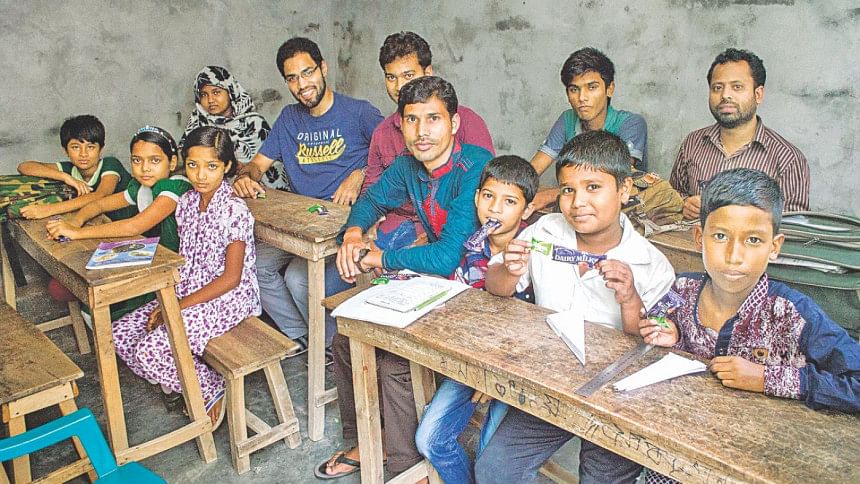Asroy a youth initiative

It is a harsh and known fact that a large sector of Bangladesh's children under 18 are underprivileged and do not have access to proper diet and nutrition, health care, clothing, shelter, and education. Asroy, a private non-profit organisation formed in 2009 by a group of dedicated and enthusiastic young individuals, began with the mission of working with the wider community to change the negative attitudes and stereotypes towards the street children of Bangladesh, in addition to focusing on providing education and healthcare to these children. Most of them, after all, are deprived of these basic needs and rights.
The story behind Asroy is quite heartening. “One winter night in December 2009, we wanted to bring warmth to the people sleeping on the streets of Dhaka," says Dr Saeem Arafat Hossain, the President of Asroy. "We distributed warm clothes to them. But in trying to find the root of the solution to end the vicious cycle of poverty, solving the problems of education and proper health care would have to be prioritised. Hence, we decided to work on providing education and healthcare.” Dr Hossain completed his MBBS from Shaheed Suhrawardy Medical College.
At the very beginning, the organisation had a mobile or a floating school at a park in Farmgate. The whole idea of the school was to reach out to children, who were otherwise unable to attend. The student body of this school consisted of the children on the street. However, according to Dr Hossain, maintaining the floating school became logistically challenging. Eventually, the founders of the school moved to a permanent address in Hazaribagh, and began providing low-cost education to slum children.
In terms of funding, Asroy runs completely on personal donations. People from all walks of life and several organisations provide both financial and structural support for the day-to-day activities of this noble initiative. The organisation also encourages people to donate a certain amount of money on special occasions and holidays, raising funds through street and social media campaigns, according to Rokaiya Shatadru, the Communications Officer at Asroy, also a third year Microbiology student at the University of Dhaka.
The school follows the national curriculum from Play Group to class 5 and prepares the children for the Primary Education Completion examinations. “We also offer extra-curricular activities like music, art, and moral science lessons for the cultural and mental development of the children, as we believe that by engaging in these activities, they will become responsible and well-rounded individuals,” asserts Sumit Biswas, the Head of Education at Asroy and a Biochemistry student at North South University. The volunteers at Asroy are mainly students of different public and private universities of the country.
After class 5, the children at Asroy are affiliated with different mainstream schools. “All the students who finished class 5 from our school in the last two years are now in different high schools, including two government high schools,” says Dr Hossain proudly. The students of Asroy have had a 100 percent pass rate in their Primary Education Completion examinations since they first appeared in 2015.
Furthermore, a regular programme of Asroy is “Health Camps,” during which groups of doctors and medical interns volunteer free health check-ups and some basic over the counter medicines to the underprivileged families. In November 2016, Asroy hosted a Dental Health Camp for its students, which included oral hygiene maintenance procedures, brushing techniques, management of immediate tooth pain, and dental check-ups, bearing in mind that slum children of the country do not have the privilege of paying regular visits to dentists.

Since its inception in 2009, Asroy has served around 11000 patients in 16 different medical camps throughout Bangladesh, and most recently, sent immediate help to Nepal during the earthquake of April 2015. They have also helped rebuild a school in Nepal.
Although the members of Asroy have had many notable triumphs, their beginnings were certainly not without obstacles. According to Dr Hossain, one of the biggest challenges on their journey to opening Asroy was convincing the parents to send their children to school. “The parents would rather use the labor of their children as the treatment for poverty than allow them to pursue an education, but they need to understand that having an education is the path to a brighter future – for their children and the country,” he says. Echoing Dr. Hossain's views, Dr Naima Afroz, a graduate of Shaheed Suhrawardy Medical College and the Vice President of Asroy, says that these children are most vulnerable, so without the proper guidance and knowledge, they do not reach their full potential and often end up picking up bad habits, or giving in to the allure of crime. This is something the team of Asroy hopes to change. So, they made it their mission to go from door to door of the slums and persistently speak to the families to make them see why their sons and daughters deserve an education.
The dedicated individuals behind Asroy truly show the value of sharing what you have for the betterment of others. Moving forward, the Asroy team hopes to establish schools and clinics in each district of Bangladesh, and enhance the position of social work in the country.
The author is a literature student at North South University.

 For all latest news, follow The Daily Star's Google News channel.
For all latest news, follow The Daily Star's Google News channel. 



Comments